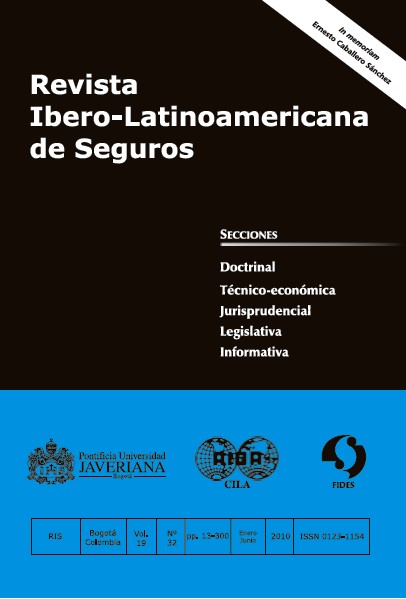Abstract
The traditional prescription notion (or concept) and more specifically, in the
insurance contract, is given by its objective interpretation. However, this notion
(or concept) has been changing, by the incorrect (in our view) introduction (or
addition) of purely subjective elements or criteria.
In fact, the purpose of this paper will be to do (or to carry out) a study about the traditional conception of the prescription, as opposed to the “modern” trend
and for many controversial, subjective vision of the prescription. This last vision
that is linked with the Estoppel Theory (venire contra factum proprium).
Once presented the theoretical and legal view of the traditional and modern
concept of the prescription, we will focus on the position adjusted to the Colombian legal system, that should guide judges when making decisions adjusted and according to the law.
To demonstrate the concepts of prescription we will presented the arbitration
award of Distral SA (EMA) General Electric Canada Inc. vs. La Nacional Compañía de Seguros Generales de Colombia S.A (traditional concept), and the arbitration awards of Alstom Brasil Ltda Sucursal Colombia vs. Compañía Suramericana de Seguros S.A and Beneficiencia del Valle del Cauca E.I.C.E. vs. La Previsora Compañía de Seguros (modern concept).
Finally, there will be a critic intended to demonstrate the legal error of arbitration courts in seeking to incorporate or apply principles or theories, without carefully analyzing the factual basis on which lay, that do not have legal validity in the Colombian legal system.
This journal is registered under a Creative Commons Attribution 4.0 International Public License. Thus, this work may be reproduced, distributed, and publicly shared in digital format, as long as the names of the authors and Pontificia Universidad Javeriana are acknowledged. Others are allowed to quote, adapt, transform, auto-archive, republish, and create based on this material, for any purpose (even commercial ones), provided the authorship is duly acknowledged, a link to the original work is provided, and it is specified if changes have been made. Pontificia Universidad Javeriana does not hold the rights of published works and the authors are solely responsible for the contents of their works; they keep the moral, intellectual, privacy, and publicity rights.
Approving the intervention of the work (review, copy-editing, translation, layout) and the following outreach, are granted through an use license and not through an assignment of rights. This means the journal and Pontificia Universidad Javeriana cannot be held responsible for any ethical malpractice by the authors. As a consequence of the protection granted by the use license, the journal is not required to publish recantations or modify information already published, unless the errata stems from the editorial management process. Publishing contents in this journal does not generate royalties for contributors.


